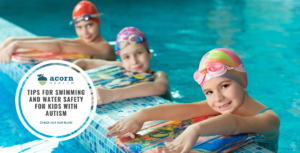Clinically reviewed by Paul Doher, BCBA, M.A., LBA, National Director of Clinical Quality

As we all transition from cooler winter weather to warmer spring and summer months, there’s a lot to look forward to. Whether your family prefers backyard barbecues, baseball games or splashing at a nearby pool, it’s hard not to get excited about summertime activities.
It’s important for families to have fun, but to also take the necessary safety precautions that some of these activities require-especially around water. All parents and caregivers can benefit from water safety reminders, and parents of children with autism need to be extra vigilant.
Why is Water Safety Important?
Tragically, accidental drowning is the cause of 91% of deaths of children with autism spectrum disorder ages 14 and younger, according to The National Autism Association. Another study by Columbia University’s Mailman School of Public Health found that in water-related deaths, children with autism are 160 times as likely to die from drowning as the general pediatric population. These frightening statistics may beg the question, why are children with autism so prone to drowning? The likely association between children with autism and drowning is not the water itself, but their propensity to wander. Almost half of all children with autism wander.
How to Notice If a Child Drowning
If you are ever in the position of having to determine whether or not an individual is drowning, there are signs to look for to best analyze the situation and seek help. Drowning often does not include yelling or frantic arm waving like you may see in movies. Instead, it is often silent because the individual is in distress. The person in the water may have a blank or glassy stare.
If you notice someone may be drowning, ask if they are OK and wait for a verbal response. Based on where you are or how large the body of water is, you may or may not have the ability to help them yourself. Provide them with a floatation device and dial 911 immediately.
Swimming and Water Safety Tips for Children with Autism
Enroll in Swim Lessons
While you hope your child is never in the position of falling into a body of water, preparing your child to survive when encountering a dangerous event is crucial. We recommend that once your child is diagnosed with autism, parents should enroll them into swimming lessons immediately. Being able to float, doggy paddle, and get back to the surface when under water are some of the skills taught during swim lessons that will help your child. When researching swim lesson providers, it is worth seeking swim lesson providers who specialize in lessons for children with autism.
Always Stay Vigilant
Parents and caregivers need to be on high alert, even in places they feel most comfortable with your child, like your home. This is because research shows that a majority of drownings occur close to an individual’s home. A study published in Injury Epidemiology looked at available data on drownings of individuals with autism and found 52% occurred in a pond, 13% in a river, and 13% in a lake, with the average distance from the victim’s home being roughly 853 feet or less than a quarter of a mile. Many of these accidents are happening in areas where parents, caregivers and children feel most comfortable.
Invest in Home Safety Equipment
Many children with autism wander and elope, and many do so quietly away from their own home. If your child is capable of leaving the home without you noticing, that’s a sign to invest in safety equipment for the house such as alarms or safety fences to ensure that children are protected from pools or water dangers nearby.
Discuss Water Safety with Your BCBA
If your child is receiving ABA therapy, talk with your BCBA about programming for water safety skills, such as how to identify when it’s safe to swim, what to do around bodies of water, who should be with them while swimming, and so on. We also encourage parents to partner with their BCBA and seek out resources or support on drowning prevention and other safety topics regularly.
–
If you’d like to inquire about beginning ABA therapy services to support your child with an autism diagnosis, call Acorn Health at 844-244-1818 or complete an online inquiry form at acornhealth.com/admissions.